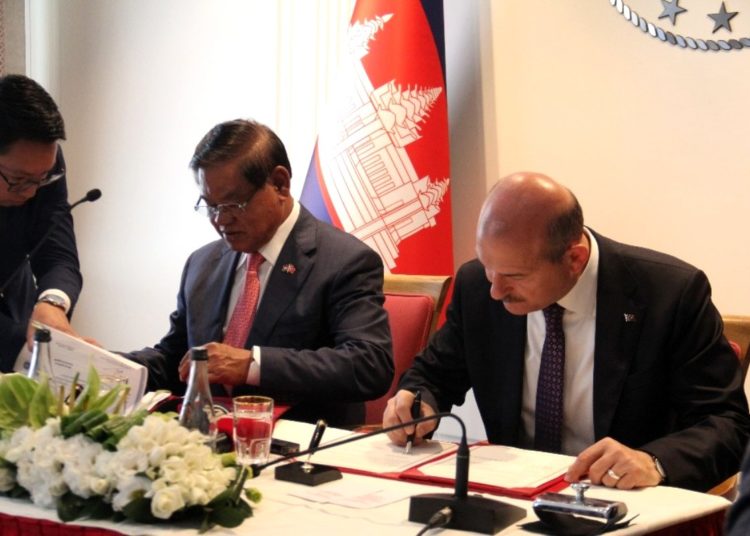Nordic Monitor
The Turkish government has signed a security cooperation agreement with Cambodia to expand its crackdown on government critics and to facilitate political persecution and abduction operations.
Similar to previous security accords, the text of the agreement, obtained by Nordic Monitor, contains ambiguous phrases that are used by the Turkish government to suppress government opponents outside the country.
Turkish Interior Minister Süleyman Soylu and his Cambodian counterpart Samdech Krolahom Sar Kheng signed the security cooperation agreement in Ankara on July 30, 2019.
Two-and-a-half months later, Mexican national Osman Karaca, who is of Turkish origin, was forcibly disappeared following his arrest by the Cambodian police on October 14, 2019 in Phnom Phen.
Cambodia was among the countries from which UN rapporteurs asked for further information about their roles in Turkey’s abduction, arbitrary arrest, detention, enforced disappearance or torture of at least 100 individuals, including Karaca, on their soil.

“In combatting terrorism, the Parties shall prevent the activities of the visual and print media agencies of terrorist organizations and their front institutions operating in their territories against the other Party,” Article 2 (3.a) of the cooperation agreement states, adding that “The Parties shall take appropriate measures in this regard according to their national legislations.”
“The parties shall organize and take measures according to its legislation in force against the persons and institutions that provide financial support or other assistance including shelter, accommodation, training and treatment and logistic support to the terrorist organizations in their territories,” Article 2 (3.b) states.
Article 2, which connects the activities of legal organizations to terrorism, is a convenient tool to force Cambodian authorities to extradite critics of President Recep Tayyip Erdoğan living in the country. Moreover, Turkey’s National Intelligence Organization (MIT) benefited from the ambiguity of the aforementioned articles to conduct an operation on Cambodian soil targeting Karaca, the former director of the Zaman International School in Cambodia, affiliated with the Hizmet/Gülen movement, a group critical of the Turkish government.
The 11-article agreement was recently submitted by President Erdoğan to parliament for ratification.
Letter submitted to Turkish parliament seeking approval of the agreement with Cambodia:
UN rapporteurs Luciano Hazan, chair-rapporteur of the Working Group on Enforced or Involuntary Disappearances; Felipe González Morales, special rapporteur on the Human Rights of Migrants; Fionnuala Ní Aoláin, special rapporteur on the Promotion and Protection of Human Rights and Fundamental Freedoms While Countering Terrorism; and Nils Melzer, special rapporteur on Torture and Other Cruel, Inhuman or Degrading Treatment or Punishment sent a joint letter dated May 5, 2020 to the Turkish government to express their concern about the “systematic practice of state-sponsored extraterritorial abductions and forcible return of Turkish nationals from multiple States to Turkey.”
In their letter the UN rapporteurs underlined that the Turkish government allegedly signed bilateral security cooperation agreements with multiple states for the expulsion or abduction of Turkish nationals and asked Turkey how those agreements are compatible with the country’s international human rights obligations.
The joint UN letter also revealed how the Turkish Embassy in Phnom Penh attempted to deceive Cambodian authorities in order to request the extradition of Karaca. According to the UN document, the Turkish diplomatic mission reported to the Cambodian police that Karaca had a fraudulent Mexican passport, after which the authorities arrested him. “The Turkish Embassy then demanded his deportation to Turkey due to ‘the lack of an international travel document.’ It is also alleged that the Turkish authorities have bribed local officials to secure their cooperation in illegal actions to arbitrarily arrest him,” the letter stated.
To secure his release from detention and ward off an attempt at an illegal extradition, the Mexican Embassy in Hanoi, accredited to Cambodia, had conveyed a note verbale to prove Karaca’s Mexican citizenship and attached a copy of his passport in its communication to Cambodian authorities.
However, Karaca was detained based on the embassy’s fabricated argument. The Turkish Embassy then pursued a smear tactic against Karaca and demanded his deportation due to the lack of an international travel document despite the Mexican Embassy having verified his citizenship. Since Aydan Ünlü, the Turkish ambassador in Phnom Penh, was well aware of Karaca’s status and the political nature of the demand, she didn’t hesitate to violate both international conventions and the regulations of the receiving state by submitting falsified arguments to the Cambodian police.
“Cambodia has a shameful track record of colluding with other governments to return wanted individuals without due process,” said Nicholas Bequelin, Amnesty International’s regional director for East and Southeast Asia and the Pacific.

According to the text of the agreement, the two countries pledge to cooperate in fighting transnational crime, in particular crimes related to terrorism, organized crime, smuggling of migrants, forgery of official documents, trafficking of human beings, narcotic drugs and psychotropic substances and their precursors. The deal also includes intelligence sharing of operational information and technical and tactical methods in combating terrorism and crime.
Furthermore, the agreement defines the cooperation mechanism and the method to be used by the relevant authorities to convey their assistance requests. “Cooperation within the framework of this Agreement shall take place based on the requests for assistance made by the competent authority concerned or upon initiative of the competent authority which deems the assistance is beneficial to the other competent authority,” Article 3 (1) notes, with section (6) stating that “The requested Party shall take all the measures necessary to execute the request in the most rapid and complete way as possible.”

Nordic Monitor previously reported how security cooperation agreements have emerged as a significant mechanism used by the regime of President Erdoğan since the Gezi anti-government protests of 2013 to harass critics living abroad. According to Nordic Monitor research, the content of the security agreements has changed in parallel to the transformation of national legislation, and the new documents contain ambiguous copy-paste phrases designed to suppress government opponents outside the country, while the number of agreements has increased since the Gezi uprising.
Text of the security cooperation agreement is posted below:












